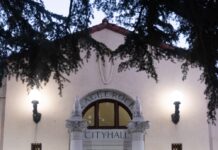Chalk messages promoting Republican presidential candidate Donald Trump appeared outside residence halls and on sidewalks throughout campus April 3. Although a majority of the messages read “Trump 2016,” there was also a derogatory remark calling Democratic presidential candidate Hillary Clinton a “money wh—,” the message “f— women” and the largest message, “#buildthatwall” — which spanned the center of the quad — a reference to Trump’s campaign promise to build a wall across the Mexican border.
According to Vice President for Equity and Inclusion and Chief Diversity Officer Rhonda Brown, the messages were located outside Newcomb, Chilcott and Haines halls, as well as throughout the path linking Bird Road to the academic quad. Eventually, Brown discovered that Occidental’s incident was part of a national event known as the “Chalkening,” where chalk messages promoting Trump were spread across U.S. college campuses. The trend began March 21 at Emory University.
Brown first learned of the messages via email Sunday afternoon and left her office to see them for herself.
“I will say, the first few I saw were simply ‘Trump 2016,’ and that’s not troublesome to me,” Brown said. “Well, its not troublesome to me that it appears, you know, [because] we can think different things about Trump’s candidacy or not, that’s not my place in that role.”
It was only when she noticed the messages directed against Clinton and women that she became concerned.
“It’s not because it’s Clinton, it’s because that can be seen as devaluing a woman, and … that changes the whole game,” Brown said. “That changes the world.”
Additionally, Brown was disturbed by the message promoting “the wall.” She said that this statement went beyond endorsing a candidate; it endorsed a position that could be offensive and harmful, particularly to immigrant populations.
Despite her concerns, Brown said that she initially believed the chalk would have to stay as protected speech. Yet the next day, she came to a realization: Although the chalk would likely be classified as protected speech, it did not follow the school’s chalking policy. According to this policy, chalking is limited to the academic quad between the Samuelson Pavilion and Johnson Student Center unless the Office of Student life approves other locations. Furthermore, the chalk must be designated as appropriate for the sidewalk and the event must be registered with the master calendar.
As addressing the content would force the administration to decide which messages can stay and which cannot, Brown said it was easier to handle the incident as a matter of posting and publicity policy. In her email to students, sent out the same day, she emphasized that this failure to follow policy was the reason the chalk was removed.
Brown stressed the importance of consistent application of school policy in posting and publicity issues. Recalling that the college applied the posting guidelines to student activist organization Oxy United for Black Liberation — when the group hung a banner outside the Arthur G. Coons Administrative Center the day before Martin Luther King, Jr. day — Brown knew that the school had to enforce the chalking policy against whomever had written the chalked messages.
Noting in her email that the administration could not wash away students’ feelings with the chalk, Brown made clear that she was open to conversations concerning the incident and students’ reactions to it. She stated that she will hold monthly town halls on incidences that trouble the Occidental community starting in the fall.
Intercultural Affairs Programming Assistant Ricardo Parada (sophomore) was hopeful that the messages would result in productive dialogue. Specifically, Parada imagined this dialogue would help the community understand the rhetoric’s impact and foster an environment that does not alienate people of different identities.
“I think that the incident itself has created a need for us to come together as a campus community and reflect on how different statements such as this otherize various members in our community including students, staff and members of the greater community that commonly visit campus,” Parada said via email.
Brown said the institution should not take a “slant” on politics by deciding which candidates can and cannot be promoted. Instead, she hoped the campus could be a place where all values and voices are heard, including Trump supporters who may not feel comfortable expressing their views.
“While I don’t support what was written in the chalking, I can understand that somebody who might support Trump as a candidate might feel that this is not a safe place to say that publicly,” Brown said. “And I’m sad about that. Because whatever you choose to support, you should be able to say, ‘This is what I believe.’”
President of the Occidental Republican Club Alan Bliss (first year) reacted to the incident by devoting the club’s regular meeting April 3 to discussing the messages. Recognizing that their club was still new to campus, Bliss feared that its members were being framed. He was clear that the club did not approve of the messages and that, to his knowledge, none of the club members were responsible.
“There’s a right and a wrong way to campaign,” Bliss said. “See, we don’t try to discourage people from supporting any candidate, including Donald Trump. However, when you’re violating school policy in doing so, that’s a problem.”
An anonymous administrator of Oxy Students for Donald Trump, a satirical Facebook page devoted to promoting the candidate, firmly denied their group’s involvement.
“We are all about a good joke, but this broke the student conduct and just wasn’t the best decision,” the administrator said via Facebook message. “Everyone has the right to express their beliefs, but not in this specific fashion. We feel Trump jokes should stay on the internet and Facebook, not on the quad.”
Although Occidental Democrats Club Treasurer Daniel Stigall (senior) did not see the chalking, he did not think it was representative of all conservative students’ beliefs. He recalled that he had seen similar incidents throughout his years at Occidental, which often turned out to be the work of individuals he called inebriated, prejudiced and sad.
Stigall welcomed anyone to attend the Democrats’ regular Tuesday meetings to discuss the incident or the election in general. He did not think the messages could be justified by an appeal to freedom of speech.
“I think the term ‘free speech’ has been co-opted a lot recently by people who want to get away with saying insensitive, ignorant or even violent things,” Stigall said via email. “Antagonizing people with sexist and xenophobic remarks is not a way to start any kind of conversation, it’s just a waste of chalk.”
![]()































